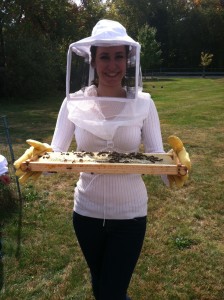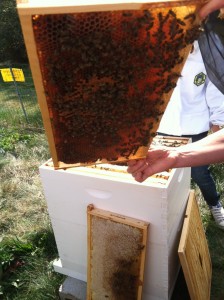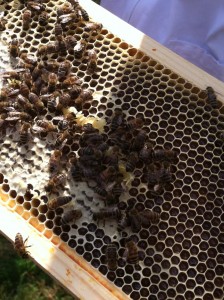“Not out to sting you” – Ramapo students bring beekeeping to campus
by lfrench | October 9, 2013 4:25 pm
By LAURA FRENCH
Ramapo students seek to raise awareness about bees through an upcoming beekeeping club on campus. The new club, which held an interest meeting in late September, will engage students in the process of raising and managing a live bee population.
“I think it’s a wonderful opportunity for students to interact with another species, to really get to know this fascinating species,” says Eric Wiener, beekeeping club’s faculty adviser.
Many students have already gotten experience with beekeeping skills at the school, thanks to an on-campus beehive which was established last spring with help from the New Jersey Beekeepers Association and Brushy Mountain Bee Farm, according to The Ramapo News[1]. Students have learned about the activity of bees, learned to care for and manage them, and even harvested some honey over the course of the last few months. In addition, several demonstrations early this month allowed students to encounter a beehive and beekeeping for the first time.
 [2]
[2]“I’m a psychology major, but I have an interest in bees because I think they’re incredible,” says Ocean Kaspi, who attended one of the demonstrations. “I think they work well as a team, I think we can learn a lot from them and this is why I joined the club and I definitely got a lot from the first day.”
Despite many people’s passion for bees and beekeeping, human-created threats are currently endangering the bee population in both North America and the rest of the world.
According to The New York Times[3], colony collapse disorder has wiped out nearly half the United States’ commercial beehives in the last year. Colony collapse disorder is the sudden, mysterious disappearance of worker bees from a beehive, often caused by bees dying outside the hive. Many believe that mass worker bee death can be blamed on the use of pesticides and herbicides by farmers.
“My understanding is that most of the colony collapse is happening with agro-industry,” says Wiener, who is an environmental science professor at Ramapo, as well as an ecologist. “So these are colonies that are sort of trucked around the country depending on what crop needs them, where and when, and those seem to be the colonies that are having the biggest problem.”
“My understanding right now is it’s still not clearly defined exactly what causes it but it seems to be related to pesticides and a lack of diversity of flowers that the bees are using in the industrial setting,” Wiener says.
Despite the losses this can cause for large-scale industrial farmers, the professor says that small-scale farmers and individual beehives like the one at Ramapo should not be affected by this problem. “I think the agro-industrial approach is very damaging to the environment, is very damaging to our health, human health.” he says. “In some ways, I’m not that concerned about this problem from what I understand of it because I believe we should be moving towards small-scale organic farming anyway.”
With this positive outlook, Wiener looks forward to helping the new club teach the Ramapo community about the benefit of bees and interacting with another species.
“[The students] seem to be really interested in educating the community about bees, and, you know, every time someone learns about another species like bees, it brings them closer to nature,” he says.
Students interested in the club also express excitement over the opportunity it has to educate and engage the Ramapo community.
 [4]
[4] [5] Beekeeper Lynn Paglia removes a honeycomb from Ramapo’s active beehive. The bees in this hive are Carniolan bees, according to Paglia.
[5] Beekeeper Lynn Paglia removes a honeycomb from Ramapo’s active beehive. The bees in this hive are Carniolan bees, according to Paglia.“I think it’s amazing and I want to join in the spring,” says Sydney Hopen, a transfer from the Minneapolis Community and Technological College. “In Minnesota, everyone did beekeeping as a hobby and I got really interested in it.”
Hopen, who studies literature, finds bees inspiring and thinks that humans have a lot to learn from their behavior. “Bees are an amazing example for relationships. They are individuals and they have their own jobs, but at the end of the day, teamwork makes the honey for the hive.”
The junior hopes the new club will spread awareness of the importance of bees not only to the campus, but to others as well. “If beekeeping club becomes successful at Ramapo, it can become an example for other colleges,” she says. “I do believe it can make a change.”
Brenda Griepenburg is another student who sees great potential in the upcoming club. The environmental studies major, who attended the club’s interest meeting, has had a rich past experience raising bees, saying “I’m a beekeeper. I grew up with bees. My grandfather had a hive.”
Griepenburg, who transferred to Ramapo this semester, says that bees are not only important to her, but to the environment as well. “Bees help pollenate plants,” she says. “They make flowers healthier and fuller.”
Though many see bees as a nuisance, or even a threat, Griepenburg sees their benefit and hopes to dispel myths about the insects she may help to raise once beekeeping club comes into full swing. She looks forward to the club “teaching people about bees, teaching that bees are nice and they’re not out to sting you.”
WATCH: Beekeeper Lynn Paglia teaches students about bees during a beekeeping demonstration at Sharp Sustainability Education Center
LISTEN: Audio interview with Lynn Paglia about bee death[6]
- The Ramapo News: http://ramaponews.com/students-all-abuzz-about-beekeeping-club-1.3067507
- [Image]: http://class1.ramaporecord.org/2013/10/09/not-out-to-sting-you-ramapo-students-bring-beekeeping-to-campus/photo-1-1/
- The New York Times: http://www.nytimes.com/2013/03/29/science/earth/soaring-bee-deaths-in-2012-sound-alarm-on-malady.html?pagewanted=all
- [Image]: http://class1.ramaporecord.org/wp-content/uploads/2013/10/photo-4-2-e1381109138369.jpg
- [Image]: http://class1.ramaporecord.org/wp-content/uploads/2013/10/photo-4-e1381287518810.jpg
- Audio interview with Lynn Paglia about bee death: http://class1.ramaporecord.org/wp-content/uploads/2013/10/Interview-with-Lynn-Paglia.mp3
Source URL: https://class1.ramaporecord.org/?p=14924